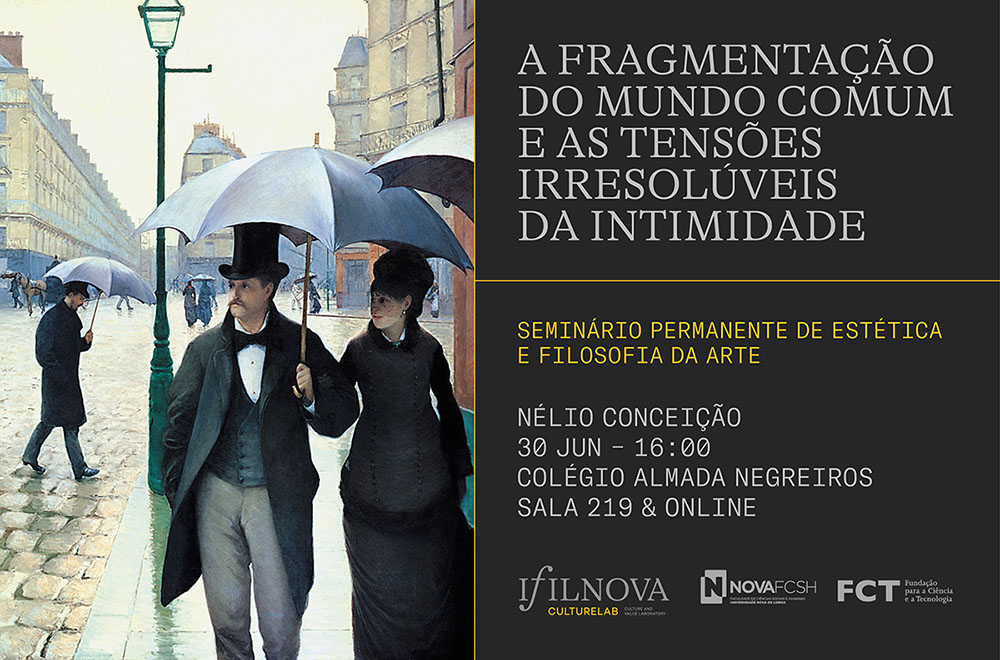The fragmentation of the common world and the unresolved tensions of intimacy

In the very first lines of the Politics, Aristotle refers that the existence of the polis aims at a good (a kind of higher value) intrinsically linked to the flourishing of the community and its individuals. Conceived as an organism, this community would enhance the “good life”. The transposition of this conception to other historical contexts, namely to modern and contemporary cities, raises a number of problems, but it is nonetheless an important reference for rethinking the consequences of the fragmentation of the common world. In the first part of this presentation, I will analyse some key moments of Aristotle’s treatise and Hannah Arendt’s understanding of the common world. When Arendt writes, in The Human Condition, that “the end of the common world has come when it is seen only under one aspect and is permitted to present itself in only one perspective”, this means, among other things, that the public sphere of common interest is closely tied to the presentation of plurality. The inability to see and hear others, or to be seen and heard, are ways of destroying the common world, a destruction that appears in a very materialised form in cities, where the space of appearance, of a potential character, is always threatened by the very sharing of space, by forms of exclusion and separation between incommensurable elements. This line of reflection will be extended and confronted with the notions of “differential space” (Henri Lefebvre) and “distribution of the sensible” (Jacques Rancière), which highlight the contradictory and agonistic character of space and allow one to broaden the relationship between the political and the aesthetic.
Another of Arendt’s analyses, concerning the progressive transformation of private space into a space of intimacy, will be the motto for the second part of the presentation. I will examine some of the consequences of this transformation, its repercussions on urban space (including the domestic) and on processes of subjectivation and self-absorption. This relates, on the other hand, to some aspects that Richard Sennett develops in The Fall of Public Man. It relates, on the other hand, to Simmel’s classic text on the metropolis, to his understanding of the often ambivalent objective and subjective conditions of life: one of the counterparts of the intensification of nervous life is the blasé character; in the same vein, the anonymity and greater individual freedom of big city dwellers also implies greater loneliness. These irresolvable tensions mirror those of other pairs of concepts, such as attention and distraction, being vigilant and letting oneself go.
The aim of this session is to question the political and aesthetic character of the common world and to provide access to some contemporary artistic expressions that work on intimacy and self-absorption. And to answer one last question: in this context, what can it mean “being present”?
Bio
Nélio Conceição is a research fellow at the NOVA Institute of Philosophy, where he coordinates the CultureLab. He obtained his PhD in Philosophy (Aesthetics) at NOVA FCSH (2013) with a thesis on the relationship between philosophy and photography. His research interests focus on aesthetics, philosophy of art and contemporary philosophy. He has been working on Walter Benjamin and Siegfried Kracauer, and on topics related to aesthetic values, the concept of play, philosophy of photography, film-philosophy and philosophy of the city, particularly in its aesthetic, social and political dimension. He was a visiting scholar at PUC — São Paulo and ZfL — Berlin. He has published articles in journals such as Eidos, Kriterion, the Journal of Aesthetics and Phenomenology and Aisthesis, and co-edited the volumes Aesthetics and Values: Contemporary Perspectives (Mimesis International, 2021), Conceptual Figures of Fragmentation and Reconfiguration (IFILNOVA, 2021) e Planos de pormenor: leituras críticas sobre a experiência da cidade (Húmus, 2023). Between 2018 and 2022, he co-coordinated the FCT-funded research project “Fragmentation and reconfiguration: experiencing the city between art and philosophy”.
The session will be in Portuguese.
To join the session on Zoom, use this link.

